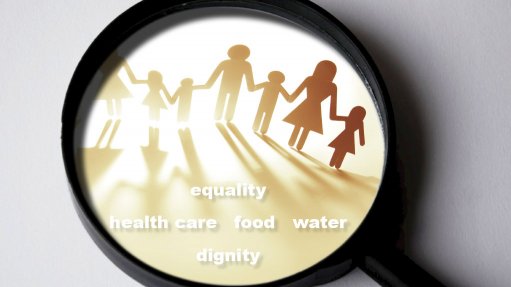
The South African Human Rights Commission (Commission or SAHRC), marked the 70th Anniversary of the Universal Declaration of Human Rights (UDHR), International Human Rights day and the 22nd Anniversary of the South African Constitution on the 10th December 2018 by releasing its premiere report, the Trends Analysis Report for the financial year 2016/2017, at its head office in Braamfontein.
The Trends Analysis Report (TAR) provides a general overview of the handling of complaints for the year under review. The report provides statistical information on the numbers and types of complaints received, referred and finalised by the Legal Services Unit (LSU), and the Commission’s nine Provincial Offices. The TAR informs Parliament and the public of the trends in human rights’ violations reported to the Commission through its complaints’ mechanisms, and the interventions it has undertaken. It provides insight into the types of human rights’ violations occurring in the country and has assisted the Commission to adopt a more integrated approach to executing its mandate and resolving complaints received, and to identify issues that require strategic intervention through litigation services, advocacy and research. The TAR also serves as a baseline to inform future strategic initiatives of the Commission.
The 2016/2017 TAR provides a snapshot of trends and findings in human rights’ violations over the past five years.
The starkest revelation by the TAR, is that complaints based on section 9 of the Constitution (the equality clause), remain the highest category of complaints received by the Commission. However, complaints based on equality are down from 749 in the 2015/2016 financial year to 705 in the current financial year under review. Out of the 705 Equality complaints directed at the Commission, 486 of these, 69%, are based on race.
The TAR indicates another anomalous and marked increase in complaints based on section 27 rights violations. These socio-economic rights are the rights to healthcare, water and sanitation as well as social security. The number of complaints in relation to these rights have increased from 428 complaints in the prior financial year to 631 in the 2016/2017 financial year, a 47% increase.
Statistics such as these and other narrative information contained within the TAR 2016/2017, provide the Commission, Parliament and the general public with a barometer of human rights scenarios across South Africa, enabling the Commission in particular to direct its resources and efforts in the execution of its Constitutional mandate to protect, promote and monitor the attainment of human rights as set out in Chapter Two of the Constitution, the Bill of Rights.
Report by the South African Human Rights Commission